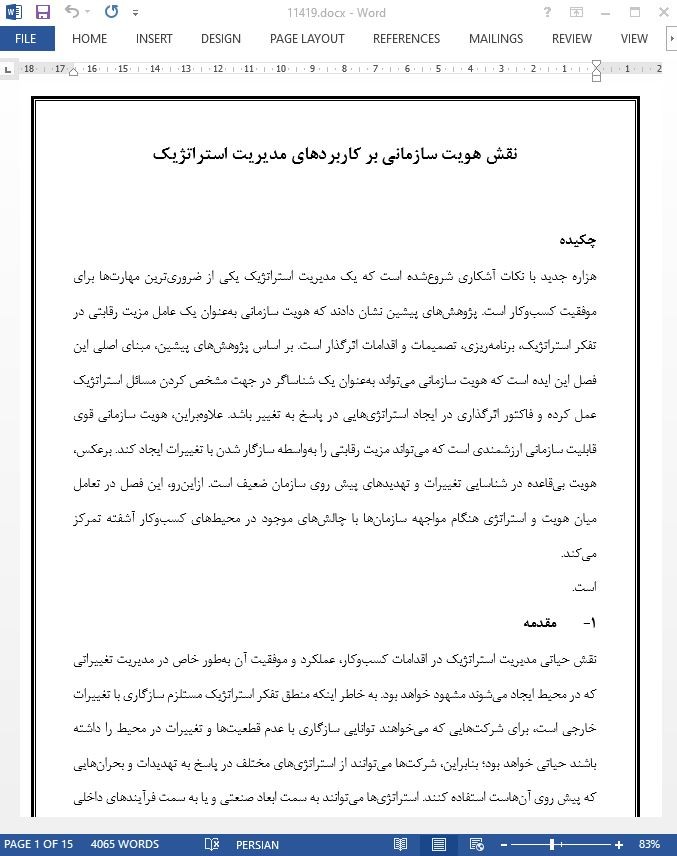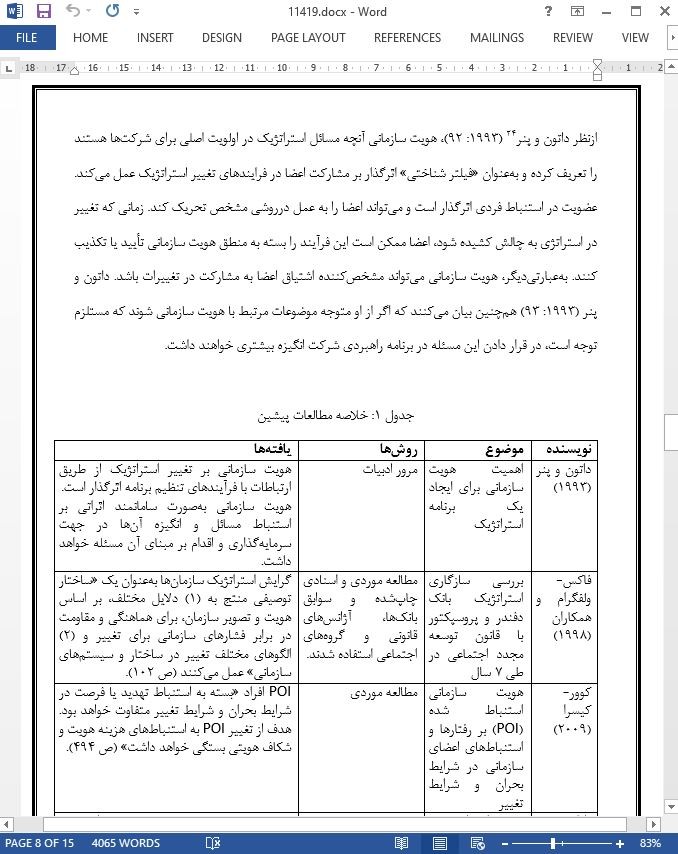
نقش هویت سازمانی بر کاربردهای مدیریت استراتژیک
چکیده
هزاره جدید با نکات آشکاری شروعشده است که یک مدیریت استراتژیک یکی از ضروریترین مهارتها برای موفقیت کسبوکار است. پژوهشهای پیشین نشان دادند که هویت سازمانی بهعنوان یک عامل مزیت رقابتی در تفکر استراتژیک، برنامهریزی، تصمیمات و اقدامات اثرگذار است. بر اساس پژوهشهای پیشین، مبنای اصلی این فصل این ایده است که هویت سازمانی میتواند بهعنوان یک شناساگر در جهت مشخص کردن مسائل استراتژیک عمل کرده و فاکتور اثرگذاری در ایجاد استراتژیهایی در پاسخ به تغییر باشد. علاوهبراین، هویت سازمانی قوی قابلیت سازمانی ارزشمندی است که میتواند مزیت رقابتی را بهواسطه سازگار شدن با تغییرات ایجاد کند. برعکس، هویت بیقاعده در شناسایی تغییرات و تهدیدهای پیش روی سازمان ضعیف است. ازاینرو، این فصل در تعامل میان هویت و استراتژی هنگام مواجهه سازمانها با چالشهای موجود در محیطهای کسبوکار آشفته تمرکز میکند.
1- مقدمه
نقش حیاتی مدیریت استراتژیک در اقدامات کسبوکار، عملکرد و موفقیت آن بهطور خاص در مدیریت تغییراتی که در محیط ایجاد میشوند مشهود خواهد بود. به خاطر اینکه منطق تفکر استراتژیک مستلزم سازگاری با تغییرات خارجی است، برای شرکتهایی که میخواهند توانایی سازگاری با عدم قطعیتها و تغییرات در محیط را داشته باشند حیاتی خواهد بود؛ بنابراین، شرکتها میتوانند از استراتژیهای مختلف در پاسخ به تهدیدات و بحرانهایی که پیش روی آنهاست استفاده کنند. استراتژیها میتوانند به سمت ابعاد صنعتی و یا به سمت فرآیندهای داخلی یک شرکت جهتگیری شده باشند (چاتوپادیای و همکاران 2001). بهعنوان یک قابلیت داخلی، هویت سازمان عامل سودمند در دستیابی به مزیت رقابتی و «ابزاری استراتژیک» برای به دست آوردن جایگاه در بازار است (استنساکر 2015). ازاینرو، هویت مسئلهای نیست که بتوان از تفکر استراتژیک یک سازمان جدا شود.
5- نتیجهگیری
چالشهای محیطی، باوجود باقی ماندن علامتهای سؤال بزرگي به لحاظ مشروعيت آنها، شاهد فروپاشی مؤسسات و شرکتهای بزرگ بسیاری بوده است. بااینحال، هویت سازمانی بهعنوان قابلیت ارزشمند سازمانی میتواند اصلاح تفکر استراتژیک و فعالیتها را در پاسخ به تغییرات حمایت کند. همچنین، تعامل هویت و سازمان حیاتی است چراکه روشهای پاسخگویی به تغییرات در محیط مختص خودشان را دارند. علاوهبراین، زمینههای شناختی و نهادی سازمانها در شکلگیری استنباطها و رفتار افراد درگیر در فعالیتهای شرکت حائز اهمیت هستند. هویت و استراتژی بر هم دیگر اثرگذار هستند و هماهنگی هویت و استراتژی به شرکتها کمک میکند به اهداف سازمانی بهصورت کارآمد و مؤثرتر دستیابی پیدا کنند.
Abstract
The new millennium started with evident hints that strategic management is one of the most required skills for business success. Previous research has shown that as a competitive advantage factor, organizational identity affects strategic thinking, planning, decisions and actions. Based on the past research, at the core of this chapter lies the idea that organizational identity can act as a detector for identifying strategic issues and can be an influential factor in developing strategies in response to change. Moreover, a strong organizational identity is a valuable organizational capability that can create competitive advantage through its urge to adapt to changes. Conversely, a loose identity is weak in detecting changes or threats directed to the organization. Thereby, the chapter focuses on the interaction between identity and strategy when organizations face challenges in the turbulent business environment.
1 Introduction
The vital role of strategic management on business operations, performance and success becomes apparent especially in managing changes that arise in the environment. As the logic of strategic thinking requires adaptation to external change, it is pivotal for firms to develop the ability to cope with uncertainties and changes in the environment. Accordingly, firms can use various strategies for responding to changes or crises they face. Strategies can be either directed outward at industry dimensions or inward toward the internal processes of the firm (Chattopadhyay et al. 2001). As an internal capability, the identity of an organization is a facilitating factor in achieving competitive advantage and a “strategic tool” for positioning in the market (Stensaker 2015). Hence, identity is not an issue that can be separated from the strategic thinking of the organization.
5 Conclusion
Leaving big question marks on their legitimacy, environmental challenges bear witness to the collapse of many institutions and enterprises. However, organizational identity as a valuable organizational capability can embrace and support the reformation of strategic thinking and activities in responses to the changes. Also, the interaction of identity and strategy is critical as both have their own ways of responding to changes in the environment. Moreover, both constitute the cognitive terrain of organizations in shaping the perceptions and behaviour of those involved in a firm’s activities. Strictly speaking, identity and strategy influence each other, and the alignment of identity and strategy helps firms to reach organizational targets in a more efficient and effective manner.
چکیده
1- مقدمه
2- هویت سازمانی
3- تعامل بین هویت و استراتژی
4- هویت سازمانی، استراتژی و تغییر
5- نتیجهگیری
Abstract
1 Introduction
2 Organizational Identity
3 The Interplay Between Identity and Strategy
4 Organizational Identity, Strategy and Change
5 Conclusion
- اصل مقاله انگلیسی با فرمت ورد (word) با قابلیت ویرایش
- ترجمه فارسی مقاله با فرمت ورد (word) با قابلیت ویرایش، بدون آرم سایت ای ترجمه
- ترجمه فارسی مقاله با فرمت pdf، بدون آرم سایت ای ترجمه



